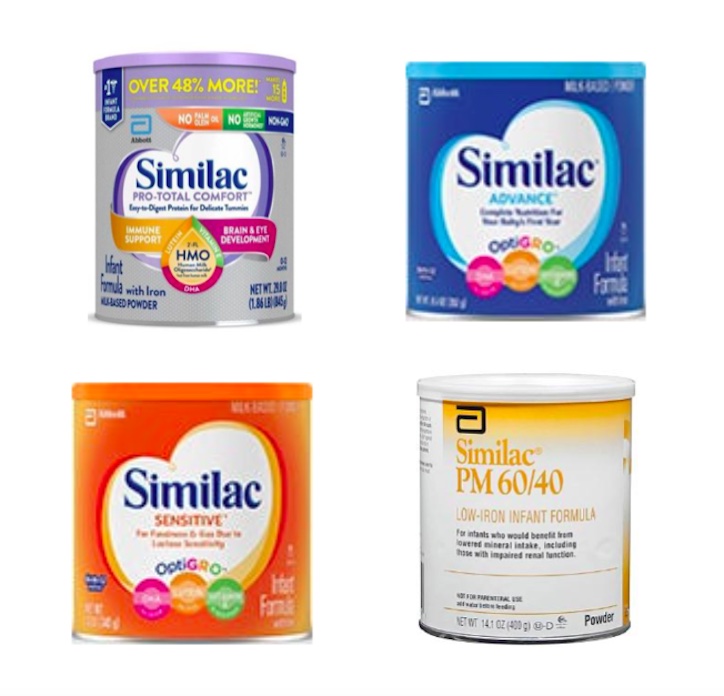The CDC, FDA, and state health departments are investigating Cronobacter illnesses among infants who consumed powdered baby formula. Between September 2021 and January 2022, four illnesses were reported -one from Minnesota, two from Ohio, and one from Texas. The two babies in Ohio died.
Cronobacter is not a “reportable disease” nationwide. So, doctors and labs aren’t required to report these infections to their state health departments who then report them to the Centers for Disease Control and Prevention (CDC). Minnesota is the only state in the country that requires reporting.
The CDC does receive reports of Cronobacter, an average of three a year. It’s just not required. So unlike illnesses from E. coli, Salmonella, or Listeria, the genetic fingerprint of the Cronobacter that made an infant sick isn’t uploaded to the CDC’s national subtyping database which health officials use to spot outbreaks.
The way Cronobacter illnesses are generally reported is through consumer complaints to the U.S. Food and Drug Administration (FDA).
In this case, both agencies received reports of Cronobacter illnesses from September 2021 to January 2022. But the CDC didn’t know about the FDA’s investigation until February 2022. Since that time they have been collaborating on the investigation.
The Cronobacter illnesses referenced in the timeline are illnesses the CDC has included in the current investigation. In July 2021 and October 2021, the agency received reports of Cronobacter illnesses that are not part of this investigation, a spokesperson told Food Poisoning Bulletin.
After the investigation was announced, the CDC received additional reports of Cronobacter illnesses among infants who consumed the now-recalled formula and is working to determine if any of them should be included in the investigation.
An FDA spokesperson told Food Poisoning Bulletin that when it received complaints of illness, it analyzed products when available.

The CDC’s Cronobacter investigation includes four illnesses and two fatalities among infants who consumed the recalled Similac products pictured.
Timeline of Chronobacter Illnesses Linked to Infant Formula
June 2020 Abbott detects Cronobacter in a powdered infant formula product produced at its plant in Sturgis, MI. that is destroyed, a company spokesman told Consumer Reports.
November 2020 The production date for the formula consumed by the earliest identified patient, the CDC told Food Poisoning Bulletin.
September 2021 A baby in St. Louis County, Minnesota is diagnosed with a Cronobacter infection. Prior to becoming ill, the baby consumed Similac Sensitive, Similac Pro-total Comfort, or Similac Advance powdered infant formula. The baby is discharged from the hospital after a 22-day stay.
September 16, 2021 The Minnesota Department of Health notifies the CDC about a baby in Minnesota with a Cronobacter infection who consumed Similac powdered infant formula prior to becoming ill, a health department spokesman told Food Poisoning Bulletin.
September 20, 2021 The Minnesota Department of Health notifies the FDA about a baby in Minnesota with a Cronobacter infection who consumed Similac powdered infant formula prior to becoming ill. Doug Schultz, a health department spokesman, told Food Poisoning Bulletin, “We typically let CDC know we have a case very early on in our case investigation (often very soon after we have a case reported to us) and would then notify FDA once we were able to collect exposure information on the case which indicated that they had consumed powdered infant formula.”
September 21, 2021 The FDA contacts Abbott to inform the company of the consumer complaint of a Cronobacter illness.
September 24, 2021 An FDA inspection of Abbott’s plant in Sturgis, MI ends with five “voluntary actions indicated.” According to inspection citation details, they were:
- Personnel working directly with infant formula, its raw materials, packaging, or equipment or utensil contact surfaces did not wash hands thoroughly in a handwashing facility at a suitable temperature after the hands may have become soiled or contaminated.
- You did not maintain a building used in the manufacture, processing, packing or holding of infant formula in a clean and sanitary condition
- An instrument you used to measure, regulate, or control a processing parameter was not properly maintained.
- You did not monitor the temperature in a thermal processing equipment at a frequency as is necessary to maintain temperature control.
- You did not install a filter capable of retaining particles 0.5 micrometer or smaller when compressed gas is used at a product filling machine
November 2021 -The FDA receives one report from Texas about an infant with a Salmonella Newport infection who consumed Similac powdered infant formula prior to becoming ill.
December 1, 2021 The CDC receives a report of another Cronobacter illness, a CDC spokesperson told Food Poisoning Bulletin.
December 18, 2021 The FDA receives a consumer complaint about Cronobacter illness.
January 4, 2022 On February 16, 2022, the CDC makes a request to state health departments for any information about Cronobacter illnesses in their states. An illness that occurred on this date, a CDC spokesperson told Food Poisoning Bulletin. It is the second fatal Cronobacter illness reported from Ohio.
January 5, 2022 The FDA and CDC each receive another report of a Cronobacter illness.
January 31, 2022 FDA inspectors return to Abbott’s plant in Sturgis, Michigan to begin another inspection. During this visit, inspectors find numerous problems. (See February 17, 2022)
On February 10, 2022 The FDA notifies the CDC that it is investigating consumer complaints of infant illness related to powdered infant formula produced at Abbott Nutrition’s plant in Sturgis, Michigan.
February 16, 2022 The CDC puts out a request to clinicians and state and local health departments for any information on other Cronobacter infections associated with infant formula from November 2020 through the present.
Around this time, test results from the FDA’s environmental swabs from “non-product contact areas” at the Sturgis plant come back positive for Cronobacter, according to the Consumer Reports article on February 25, 2022.
February 17, 2022 The FDA announces that it is investigating three Cronobacter illnesses and one Salmonella infection reported among infants who consumed powdered infant formula made at Abbott Nutrition’s plant in Sturgis, MI. One of the babies has died.
The agency states that during an inspection FDA investigators found “several positive Cronobacter results from environmental samples taken by FDA, and adverse inspectional observations by FDA investigators. A review of the firm’s internal records also indicates [s] environmental contamination with Cronobacter sakazakii and the firm’s destruction of product due to the presence of Cronobacter.”
The FDA issues a consumer advisory for Similac, Alimentum, and EleCare powdered infant formula produced in the Sturgis, MI facility.
Shortly after the FDA announcement, Abbott Nutrition issues a recall for Similac, Alimentum, and EleCare powdered infant formula produced in the Sturgis, MI facility.
Products included in the Alimentum, EleCare, Similac recall can be identified by the following information on the bottom of the can:
- The first two digits of the code are 22 through 37
- The code on the container contains K8, SH, or Z2,
- The expiration date is 4-1-2022 (APR 2022) or later
Although it is not stated by the company or the FDA, the recall includes formulas made over a 15-month period dating back to November 2020, the production date for the formula consumed by the earliest identified patient.
February 28, 2022 The CDC adds the January 4, 2022 illness to the investigation. This infant is reported to have consumed Similac PM 60/40 before becoming ill.
Abbott expands the Similac recall to include a single lot of Similac 60/40. The lot code is 27032K800.
The FDA states Similac 60/40 is the only specialty product included in the recall, sparking confusion among consumers on social media. Aren’t all Similac brand products with the three pieces of identifying information on the bottom of the can included? How can powdered specialty products made at the Sturgis plant be free of Cronobacter but others aren’t?
March 9, 2022 The Salmonella Newport illness is removed from the investigation after the FDA says it has determined that there is not enough information to definitively link this illness to powdered infant formula.
March 11, 2022 Three weeks after the initial recall, FDA publishes a full list of the recalled products to provide clarity to consumers. (See below) The agency also states for the first time that in addition to powdered infant formula, Abbott’s Sturgis plant also makes metabolic and other medical specialty infant formulas for infants with special medical needs. But with the exception of the one lot of Abbott Similac PM 60/40, these products are not included in the recall.
The reason for this is that “the FDA has determined that the risk of not having these specialty products available could significantly worsen underlying medical conditions. For many of these patients, the risk of life-threatening adverse events from restricted access to these critically needed products is likely greater than the risk from consuming products that have been produced at the facility.” Still, the agency wanted to let parents know that there may be a risk of Cronobacter contamination with these products so they can talk with their child’s doctor about what they should do.
Powdered Infant formula made at Abbott’s plant in Sturgis, MI that is included in the recall:
Similac Products
Abbott Similac 360 Total Care Infant Formula with Iron
Abbott Similac Advance
Abbott Similac Advance Step-1
Abbott Similac Advance Step-2
Abbott Similac Advance Infant Formula with Iron
Abbott Similac Human Milk Fortifier
Abbott Similac Organic
Abbott Similac Organic with A2 Milk Infant Formula with Iron
Abbott Similac Organic with A2 Milk Toddler Drink
Abbott Similac Organic Toddler with A2 Milk Infant Formula with Iron
Abbott Similac Pro-Advance
Abbott Similac Pro-Advance Infant Formula with Iron
Abbott Similac Pro-Sensitive Infant Formula with Iron
Abbott Similac Pro-Total Comfort Infant Formula with Iron
Abbott Similac Sensitive
Abbott Similac Sensitive Infant Formula with Iron
Abbott Similac Sensitive Lactose Sensitivity
Abbott Similac for Supplementation
Abbott Similac For Spit Up Infant Formula with Iron
Abbott Similac Total Comfort
Abbott Similac Total Comfort Infant Formula with Iron
Abbott Similac EleCare HMO
Abbott Similac EleCare
Abbott EleCare Similac Gold
Abbott EleCare Similac
Abbott Similac PM 60/40 – only lot code 27032K80 (can) / 27032K800 (case)
Alimentum Products
Abbott Infant Formula Powder
Abbott Similac Alimentum
Abbott Similac Alimentum Allergies & Colic Hypoallergenic Infant Formula
Abbott Similac Alimentum with 2′-FL HMO
Abbott Similac Alimentum Eye Q Plus
Abbott Similac Alimentum HMO
Abbott Alimentum HMO
Abbott Similac Alimentum infant formula
Abbott Similac Alimentum Infant Formula with Iron
Abbott Similac Alimentum Toddler Drink
EleCare Products
Abbott EleCare
Abbott EleCare Amino Acid-Based Powder Infant Formula with Iron
Abbott EleCare Infant Formula Unflavoured
Abbott EleCare Junior Vanilla
Abbott EleCare Jr Similac Vanilla
Abbott EleCare Jr Amino Acid-Based Nutrition Powder Unflavored
Abbott EleCare Jr Amino Acid-Based Nutrition Powder Banana
Abbott EleCare Jr Amino Acid-Based Nutrition Powder Chocolate
Abbott EleCare Similac
Abbott EleCare Similac Gold
Abbott Similac EleCare HMO
Abbott Similac EleCare
EleCare LCP Hypoallergenic

.




